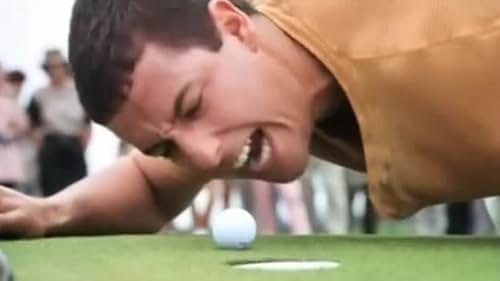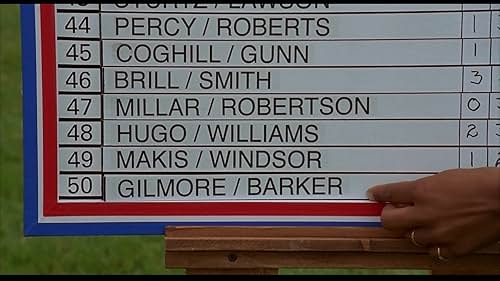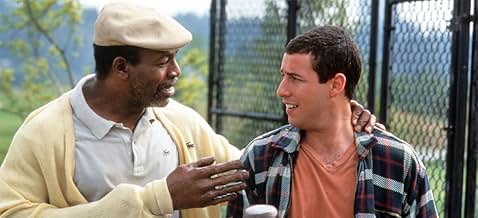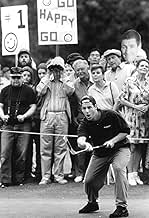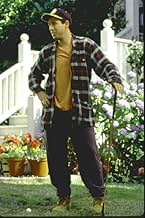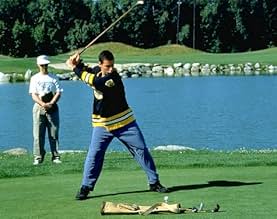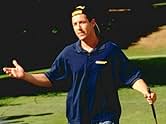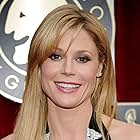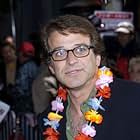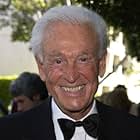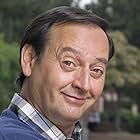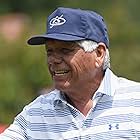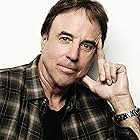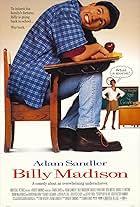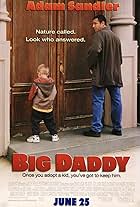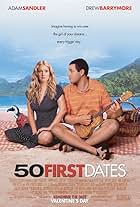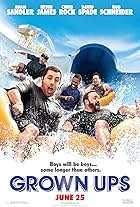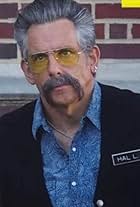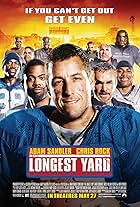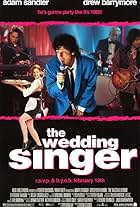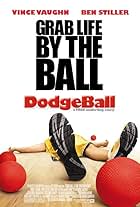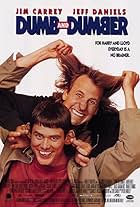After his grandmother's house is repossessed by the IRS, a bad tempered hockey player takes his talents to golf to earn the big bucks and get his grandmothers house back.After his grandmother's house is repossessed by the IRS, a bad tempered hockey player takes his talents to golf to earn the big bucks and get his grandmothers house back.After his grandmother's house is repossessed by the IRS, a bad tempered hockey player takes his talents to golf to earn the big bucks and get his grandmothers house back.
- Awards
- 1 win & 4 nominations
Ken Camroux-Taylor
- Coach
- (as Ken Camroux)
Nancy Hillis
- Terry
- (as Nancy McClure)
- Director
- Writers
- All cast & crew
- Production, box office & more at IMDbPro
Storyline
Did you know
- TriviaBob Barker wasn't sure if he wanted to be in the movie. When he learned that he was going to win the fight with Adam Sandler, he accepted the role.
- GoofsAt the beginning when Happy is playing hockey, he hits the puck at the glass which the two coaches are standing behind. The glass clearly gets broken but then in the next close-up shot of the two coaches, the glass is back. A reflection can be seen in it.
- Quotes
Shooter McGavin: [after buying grandma's house in an auction] You're in big trouble though, pal. I eat pieces of shit like you for breakfast!
Happy Gilmore: [laughing] You eat pieces of shit for breakfast?
Shooter McGavin: [long pause] No!
- Crazy creditsThe End appears before the end credits roll.
- Alternate versionsHappy's line of "The price is wrong, bitch" is changed depending on the channel. Some versions replace "bitch" with "geek"; others replace it with "Bob."
- SoundtracksTuesday's Gone
Written by Allen Collins, Ronnie Van Zant
Performed by Lynyrd Skynyrd
Courtesy of MCA Records
Featured review
In Happy Gilmore, Sandler plays the part of a determined hockey player who doesn't make the team but soon inadvertently discovers that his hockey skills translate very nicely onto the golf green. Until the point in the film where Happy begins playing golf, most of the laughs come from his misfortune (`Happy Gilmore
I called your name, didn't I?' [eagerly] `No, you didn't.' `Oh, well, better luck next year!!'), but it is the conflictive interaction between himself as a self-proclaimed hockey player and the much more formal and (for lack of a better word) high class game of golf that makes up the majority of the entertainment for the rest of the film.
There is clearly a take on the classic odd-couple comedy structure here, as Sandler's vulgar hockey habits collide with the neatness and formality of the golf green, and for the most part, this comedy scheme works pretty well here. Sandler seems to adopt the character of Happy Gilmore with great relish as he displays violent acts of hilariously misplaced aggression, clearly foreshadowing his similar actions as Bobby Boucher in The Waterboy. Indeed, some of the funniest parts of the film come from his lengthy streams of profanity at the misbehaved ball when it doesn't go where he wants it to go (`PIECE!! OF!! MONKEY *beep*!!').
So you have an undeniably entertaining and amusing character who does undeniably funny things, but it is at the logical level that this film falls on its face. Luckily for the movie and for its fans, this is not the most important element of a movie like this. It's not very likely that a slob like Happy, who doesn't make the hockey team, is going to suddenly find himself bringing in thousands and thousands of dollars left and right, and stick to his plan to buy his grandmother's house back. You would think that, having seen that he can make that much money, he would at least have kept going for a while instead of quitting as soon as he had accumulated enough to buy back the house. A noble cause, obviously, but no red blooded American male on the planet is going to just quit the game because he prefers hockey or he hates his lead opponent. But who cares? Sandler delivers the steady stream of laughs as Gilmore with such skill that the comedy of the film far overshadows any such imperfections.
Gilmore himself seems to be a bit overly violent in scenes where it doesn't seem entirely necessary, and there is clearly some overdone product placement, but it doesn't take away from the rest of the film. Mike Meyers made brilliant use of product placement in Wayne's World in such ways that added hugely to the comedy of the film (although he tripped over this technique in Austin Powers 2, when he made it massively over-emphasized and stonily unamusing), and the excessive violence of the Gilmore character is justified (although just barely) by the fact that his imperfect characteristics make his efforts (or lack thereof) to fit in with professional golfers even more amusing. As the pros stand around sipping expensive wine and discussing their respective accomplishments, Happy walks in asking where the pinball machine and the keg are. They want fame and recognition, he wants money and beer (and Virginia, the sexy reporter who fills the role of the obligatory love interest in the typical Sandler film).
There are a lot of scenes in Happy Gilmore that, as much as I personally enjoy the movie, simply fall flat (many of which involve the homeless guy who Happy employs as his caddie, or the nutcase that Shooter McGavin employs to destroy Gilmore's chances of winning the tournament, or anything involving Chubbs' prosthetic hand) but the film succeeds where it is supposed to. Sandler presents Gilmore as a strangely likeable character, despite all of his destructive habits, and the film is peppered with other notable performances, not the least of which are by Carl Weathers as Chubbs, the former golf pro who takes upon himself the immense task of taming the wild Gilmore, and Christopher MacDonald, in yet another brilliantly hate-able role as the immutable Shooter McGavin.
Happy Gilmore is a comedy from Adam Sandler, which means that you already know what kind of movie that you are going to get here, so don't complain if it turns out to be what you expected. Sandler does not make award-winning films, and chances are he never will, but the comedic value of Happy Gilmore is unquestionable. It is, to sum it up just as briefly as movies like this can be summed up, a perfect example of what I like to call Fast Food Cinema. It's a lot of fun, but there's no nutritional value.
There is clearly a take on the classic odd-couple comedy structure here, as Sandler's vulgar hockey habits collide with the neatness and formality of the golf green, and for the most part, this comedy scheme works pretty well here. Sandler seems to adopt the character of Happy Gilmore with great relish as he displays violent acts of hilariously misplaced aggression, clearly foreshadowing his similar actions as Bobby Boucher in The Waterboy. Indeed, some of the funniest parts of the film come from his lengthy streams of profanity at the misbehaved ball when it doesn't go where he wants it to go (`PIECE!! OF!! MONKEY *beep*!!').
So you have an undeniably entertaining and amusing character who does undeniably funny things, but it is at the logical level that this film falls on its face. Luckily for the movie and for its fans, this is not the most important element of a movie like this. It's not very likely that a slob like Happy, who doesn't make the hockey team, is going to suddenly find himself bringing in thousands and thousands of dollars left and right, and stick to his plan to buy his grandmother's house back. You would think that, having seen that he can make that much money, he would at least have kept going for a while instead of quitting as soon as he had accumulated enough to buy back the house. A noble cause, obviously, but no red blooded American male on the planet is going to just quit the game because he prefers hockey or he hates his lead opponent. But who cares? Sandler delivers the steady stream of laughs as Gilmore with such skill that the comedy of the film far overshadows any such imperfections.
Gilmore himself seems to be a bit overly violent in scenes where it doesn't seem entirely necessary, and there is clearly some overdone product placement, but it doesn't take away from the rest of the film. Mike Meyers made brilliant use of product placement in Wayne's World in such ways that added hugely to the comedy of the film (although he tripped over this technique in Austin Powers 2, when he made it massively over-emphasized and stonily unamusing), and the excessive violence of the Gilmore character is justified (although just barely) by the fact that his imperfect characteristics make his efforts (or lack thereof) to fit in with professional golfers even more amusing. As the pros stand around sipping expensive wine and discussing their respective accomplishments, Happy walks in asking where the pinball machine and the keg are. They want fame and recognition, he wants money and beer (and Virginia, the sexy reporter who fills the role of the obligatory love interest in the typical Sandler film).
There are a lot of scenes in Happy Gilmore that, as much as I personally enjoy the movie, simply fall flat (many of which involve the homeless guy who Happy employs as his caddie, or the nutcase that Shooter McGavin employs to destroy Gilmore's chances of winning the tournament, or anything involving Chubbs' prosthetic hand) but the film succeeds where it is supposed to. Sandler presents Gilmore as a strangely likeable character, despite all of his destructive habits, and the film is peppered with other notable performances, not the least of which are by Carl Weathers as Chubbs, the former golf pro who takes upon himself the immense task of taming the wild Gilmore, and Christopher MacDonald, in yet another brilliantly hate-able role as the immutable Shooter McGavin.
Happy Gilmore is a comedy from Adam Sandler, which means that you already know what kind of movie that you are going to get here, so don't complain if it turns out to be what you expected. Sandler does not make award-winning films, and chances are he never will, but the comedic value of Happy Gilmore is unquestionable. It is, to sum it up just as briefly as movies like this can be summed up, a perfect example of what I like to call Fast Food Cinema. It's a lot of fun, but there's no nutritional value.
- Anonymous_Maxine
- Apr 16, 2002
- Permalink
Everything New on Hulu in November
Everything New on Hulu in November
There's a whole lot to love about Hulu's streaming offerings this month — get excited for brand-new series premieres and film favorites to watch at home.
Details
- Release date
- Country of origin
- Official site
- Language
- Also known as
- Adam Sandler's Happy Gilmore
- Filming locations
- Production companies
- See more company credits at IMDbPro
Box office
- Budget
- $12,000,000 (estimated)
- Gross US & Canada
- $38,824,099
- Opening weekend US & Canada
- $8,514,125
- Feb 18, 1996
- Gross worldwide
- $41,205,099
Contribute to this page
Suggest an edit or add missing content


